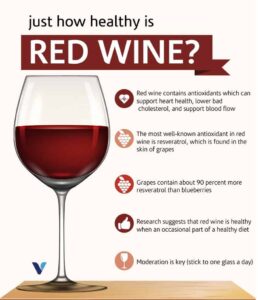With its rich history and culinary versatility, red wine vinegar has caught the attention of health enthusiasts around the world. From its roots in ancient cultures to its modern status as a culinary staple, this delicious juice boasts many claimed health benefits but one question stands out amidst the buzz: is drinking red wine vinegar really good for you?
Join us as we delve into the world of red wine vinegar and separate fact from fiction. Let’s delve into the mysteries and find out the truth about this beloved culinary treasure.
What is red wine vinegar?
Red wine vinegar, a special pantry beloved for its pungent taste and numerous culinary properties, is a form of red wine vinegar Let us explore its definition, recipe and nutritional information.
Definitions and Procedures:
Red wine vinegar is made by two methods. First, red wine is alcoholic, where yeast converts sugar into alcohol. Acetic acid bacteria then convert the alcohol into acetic acid, which is the main component of vinegar. This gives the red wine vinegar a characteristic tartness and acidity.
As the wine ferments, they typically age in wooden barrels, giving the vinegar a fresh flavor and complexity. The length of aging can vary, with some vinegars aging for months or years to achieve the desired flavor.
Health Benefits of Red Wine Vinegar
Overview of the potential health benefits supported by research:
- Red wine vinegar is lauded for its numerous potential health benefits, backed by scientific research and anecdotal evidence.
- While further studies are needed to confirm some claims, preliminary research suggests that red wine vinegar may offer various advantages for overall wellness.
Discussion on its role in digestion, weight management, and heart health:
- Digestion: Red wine vinegar is believed to aid digestion by stimulating the production of digestive enzymes and promoting a healthy gut environment.
? It may help alleviate symptoms of indigestion, bloating, and acid reflux.
? Consuming small amounts of red wine vinegar diluted in water before meals may enhance digestion and nutrient absorption.
- Weight Management: Some studies suggest that acetic acid, the main component of red wine vinegar, may have a beneficial effect on weight management.
? Acetic acid has been shown to suppress appetite and increase feelings of fullness, potentially reducing calorie intake.
? Incorporating red wine vinegar into salad dressings or using it as a marinade may support weight loss efforts when combined with a healthy diet and exercise.
- Heart Health: The polyphenols found in red wine vinegar, along with its potential ability to lower cholesterol levels and improve blood sugar control, may contribute to heart health.
? Regular consumption of red wine vinegar may help reduce the risk of heart disease by lowering LDL (bad) cholesterol and increasing HDL (good) cholesterol levels.
? Additionally, its anti-inflammatory properties may support cardiovascular health by reducing inflammation and oxidative stress in the body.
Potential Risks and Side Effects
Address any potential drawbacks or risks associated with consuming red wine vinegar:
- While red wine vinegar offers several potential health benefits, it’s essential to be aware of potential risks and side effects.
- Understanding these risks can help individuals make informed decisions about incorporating red wine vinegar into their diets.
Discuss acidity levels, tooth enamel erosion, and potential interactions with medications:
- Acidity Levels:
? Red wine vinegar is highly acidic, which can pose risks for individuals with sensitive stomachs or certain medical conditions such as acid reflux or gastritis.
? Consuming large quantities of red wine vinegar may exacerbate symptoms of acid reflux or heartburn in susceptible individuals.
- Tooth Enamel Erosion:
? The acidity of red wine vinegar can erode tooth enamel over time, leading to tooth sensitivity, decay, and potential dental issues.
? To minimize the risk of enamel erosion, it’s advisable to dilute red wine vinegar with water when consuming it orally and to rinse the mouth afterward.
- Potential Interactions with Medications:
? Red wine vinegar may interact with certain medications, particularly those that affect blood sugar levels or potassium levels.
? Individuals taking medications for diabetes, high blood pressure, or kidney disease should consult their healthcare provider before regularly consuming red wine vinegar.
Debunking Myths and Misconceptions
Address common misconceptions about red wine vinegar:
- Despite its popularity as a health tonic, red wine vinegar is sometimes surrounded by myths and misconceptions that can lead to confusion about its actual benefits.
Provide practical tips and ideas for adding red wine vinegar to meals and beverages:
- Red wine vinegar can add a burst of flavor to a variety of dishes and beverages, enhancing both taste and nutritional value.
Offer recipes and suggestions for incorporating it into salads, dressings, and marinades:
- Salad Dressings:
? Create a simple vinaigrette by combining red wine vinegar with olive oil, Dijon mustard, honey, salt, and pepper.
? Toss mixed greens with the vinaigrette for a refreshing salad with a tangy twist.
- Marinades:
? Marinate chicken, fish, or tofu in a mixture of red wine vinegar, garlic, herbs, and olive oil for added flavor and tenderness.
? Allow the protein to marinate for at least 30 minutes before grilling, baking, or pan-searing.
- Pickled Vegetables:
? Use red wine vinegar to pickle vegetables such as cucumbers, onions, carrots, or radishes.
? Combine sliced vegetables with red wine vinegar, water, sugar, salt, and spices, then refrigerate for a few hours or overnight for tangy pickled treats.
- Sauces and Glazes:
? Use red wine vinegar to deglaze pans and create flavorful sauces for meat, poultry, or vegetables.
? Reduce red wine vinegar with honey, garlic, and herbs to make a delicious glaze for roasted vegetables or grilled meats.
- Beverage Enhancer:
? Add a splash of red wine vinegar to sparkling water for a refreshing and unique mocktail.
? Mix red wine vinegar with fruit juice and herbs for a flavorful shrub, a tangy syrup that can be used in cocktails or non-alcoholic drinks.
conclusion
In conclusion, red wine vinegar can be an aromatic and versatile addition to your diet, offering potential health benefits such as aiding digestion and supporting heart health. Although adding red wine vinegar to your meals can enhance your taste and nutritional value, it is important to do it in moderation and incorporate it into a balanced diet. Remember to consult a health professional if you have any concerns or specific health conditions. Make the right choices when it comes to your diet, and enjoy the tangy flavor of red wine vinegar in your favorite dishes.



